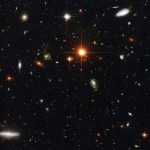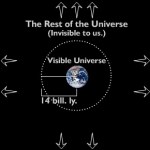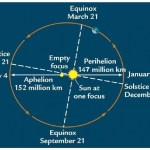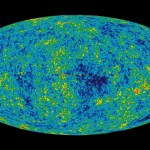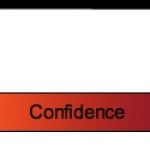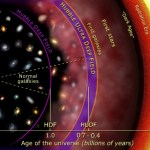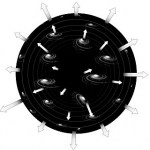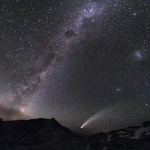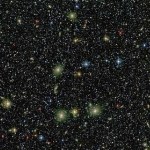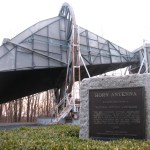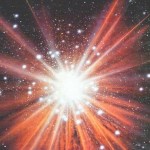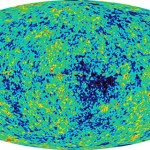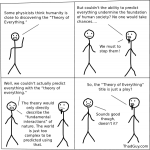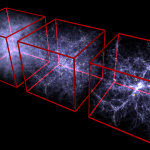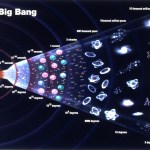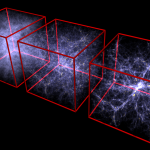Big Bang
"It is said that there's no such thing as a free lunch. But the Universe is the ultimate free lunch." -Alan Guth
We've talked about the Big Bang too many times to count, and why it's easily the leading theory regarding the origin of the Universe. It's the only cosmic idea we have that can explain all three of the following observations:
1.) The Hubble Expansion of the Universe. When we look out at distant galaxies, we find that the farther a galaxy is from us, the faster it's receding from us! It was realized pretty early on that this is because space itself is expanding!
This means that…
"How'd the moon get here? Look, you pinheads who attacked me for this, you guys are just desperate. How'd the moon get here? How'd the sun get there? How'd it get there? Can you explain that to me? How come we have that and Mars doesn't have it?" -Bill O'Reilly
Once upon a time, humans looked at the tides -- going out and coming in -- and we had no idea what caused them. At high tides, the sea level would rise, and the coast would get swept up by the oceans, while at low tides, the water would recede, leaving tidepools behind.
Image credit: smugmug.com.
Low tides and high tides would each…
"One creates from nothing. If you try to create from something you're just changing something. So in order to create something you first have to be able to create nothing." -Werner Erhard
One of the oldest adages in existence is you can't get something for nothing, as over a million websites will tell you, including not-so-subtly, cartoonstock.
And, most often when people bring this up to me, it's in an attempt to prove the existence of God -- and the insufficiency of the Big Bang -- by pointing to the Universe.
Image credit: chaospet.
Well, let's take this question as seriously as our…
"The size of the universe is no more depressing than the size of a cow." -David Deutsch
But it is bizarre, I'll give you that. The most common scientific question I get asked is how, if the Universe is 13.7 billion years old, and the speed limit of the Universe is the speed of light, why do I say the observable Universe is 93 billion light years across?
In other words, why is this picture of the Universe wrong?
I've tried to answer this before, and so have others, but perhaps it's time for another -- more conceptual -- attempt. This is one of the most mind-boggling things about relativity.…
"Cheers to a new year and another chance for us to get it right." -Oprah Winfrey
We've just completed another trip around the Sun, both in terms of the calendar year, and also the way astronomers measure it, by returning once again to perihelion, the closest point in our orbit to the Sun.
If you look up at the sky, and you watch the Sun, the Moon, and the planets all move through it, you'll notice something spectacular.
Image credit: Larry Landolfi.
To within a very small separation in the sky, the Sun, the Moon, and each of the planets (Venus and Saturn in this picture) all follow the…
"There is only one corner of the universe you can be certain of improving, and that's your own self." -Aldous Huxley
Earlier this week, I told you the story of how we went from a Universe that was -- at one time -- almost perfectly smooth, full of tiny, random fluctuations in density,
to the Universe we have today, full of stars, galaxies, and clusters of galaxies all clumped together in a beautiful cosmic web of structure.
But there was one picture I showed that generated a lot of questions. I put up an image showing what the Universe was made out of today (when we have this great cosmic…
"Nullius in Verba.
(Take nobody's word for it.)" -Motto of the Royal Society
You know the drill. New ideas come out all the time. Sometimes they're new theories, sometimes they're old theories with a new twist, but regardless, we need to ask the question: How good is your theory?
For whatever it's worth, I came up with a scale for this.
The best ideas are beyond validated. They are confirmed over and over, predict new phenomena that gets verified, and don't have any self-inconsistencies.
Well, a couple of weeks ago, a new twist on an old idea was proposed by Roger Penrose.
A little…
"It is all a matter of time scale. An event that would be unthinkable in a hundred years may be inevitable in a hundred million." -Carl Sagan
There's some speculation that NASA, later this week, might announce evidence for life on Saturn's moon Titan.
I'm not going to comment on the speculation, but it's worth asking the question, scientifically, "How would the Universe make life, from scratch?"
Let's start by telling you what "scratch" means. If you're familiar with the story of the Universe, one of the things you know is that things were very hot and dense in the past. So hot that you…
"Really, the fundamental, ultimate mystery -- the only thing you need to know to understand the deepest metaphysical secrets -- is this: that for every outside there is an inside and for every inside there is an outside, and although they are different, they go together." -Alan Watts
We've talked, recently, about the scale of the Universe, and trust me, it's huge.
Filled with hundreds of billions of giant, Milky Way-sized galaxies,
each of which contains nearly a trillion stars,
the whole thing is really, really big. And, after nearly 14 billion years of expansion since the big bang, the…
"You can't have a light without a dark to stick it in." -Arlo Guthrie
You know the story. Every galaxy we look out at, with hardly any exceptions, appears to be moving away from us. Not only that, but the farther away a galaxy appears to be, the faster it appears to move away from us!
What do we observe that leads us to believe this? Well, thanks to Edwin Hubble, who looked at the spectra of distant galaxies, we discovered that, compared to Earth, where we make atoms emit and absorb light at very specific wavelengths (or frequencies):
for distant galaxies, these emission/absorption lines…
"The most common of all follies is to believe passionately in the palpably not true. It is the chief occupation of mankind." -H. L. Mencken
If you went back 100 years in time, you could rightfully claim that, scientifically, we had no convincing evidence as to where our Universe came from. After all, when we looked up at the night sky and saw the Milky Way, we thought that was pretty much the full extent of the Universe.
Thankfully, times have changed, and the scientific discoveries coupled with the theoretical advances we've made have given us a consistent, accurate picture of a Universe…
"I admitted, that the world had existed millions of years. I am astonished at the ignorance of the masses on these subjects. Hugh Miller has it right when he says that 'the battle of evidences must now be fought on the field of the natural sciences.'"
-James A. Garfield, future U.S. President, in 1859
You will find all sorts of ideas out there on how old the Earth, the Galaxy, and the Universe are. Some contend that it's only a few thousand years old, while others contend that it's infinitely old.
You and I are free to believe whatever we want, of course. But before you decide what you…
"To exist in this vast universe for a speck of time is the great gift of life. Our tiny sliver of time is our gift of life. It is our only life. The universe will go on, indifferent to our brief existence, but while we are here we touch not just part of that vastness, but also the lives around us." -Terry Goodkind
Our view of the Universe changed forever in the 1960s with the discovery of the cosmic microwave background, known today to be the leftover glow from the Big Bang. This microwave-wavelength radiation, coming uniformly from all directions in the sky, was discovered with this…
"Prediction is very difficult, especially if it's about the future." -Neils Bohr
As many of you know, the Big Bang is one of the most powerful scientific theories we have.
It's also one of the most unsettling. The idea that our entire Universe -- filled with practically a trillion galaxies -- is only three times as old as our Sun and was once compressed into the size of your thumb is pretty unsettling.
As an astute commenter noted earlier this week,
I'm asking what persuasive predictions BB has to its credit. Most usually the best I see is new observations favoring one BB variant over…
The task is not so much to see what no one yet has seen, but to think what no body yet has thought about that which everyone sees. -Arthur Schopenhauer
Most of you who've been reading Starts With A Bang for a while have seen this picture come up many, many times.
Why do I keep putting it up, and why is it so important?
Let's go back to the 1960s for a little bit. Back then, there were two major rival theories about the origin of the Universe: the Big Bang theory and the Steady-State model of the Universe. The Big Bang contended that the Universe was hotter and denser in the past, and thus of…
"If we lived on a planet where nothing ever changed, there would be little to do. There would be nothing to figure out. There would be no impetus for science. And if we lived in an unpredictable world, where things changed in random or very complex ways, we would not be able to figure things out. But we live in an in-between universe, where things change, but according to patterns, rules, or as we call them, laws of nature. If I throw a stick up in the air, it always falls down. If the sun sets in the west, it always rises again the next morning in the east. And so it becomes possible to…
I am going to try to answer another Ask a ScienceBlogger question. This one is from George P. Burdell. He asks:
"If the universe is expanding from the big bang, has anyone tried to reverse plot the galaxies to figure out the exact point where the big bang occurred?"
Actually, he asked two questions, but I am just answering the first. Second, let me note that I am not really a cosmologist - so I am just making up answer.
In short, the answer is that everywhere is the center of the universe. Think of it this way. Imagine that there are only two dimensions and these two dimension are the…
Perhaps in time the so-called Dark Ages will be thought of as including our own.
-Georg Lichtenberg
We've been going through the history of the Universe -- from inflation to the present day -- and you can read parts 1, 2, 3, 4, 5, 6, 7, 8, and 9 here. The last thing that happened was we had a Universe filled with neutral atoms -- mostly hydrogen with some helium and a negligible amount of everything else -- that had begun to collapse under its own gravity.
When a few regions of space got dense enough, about 50 million years into the story, we made the first stars!
But there's a problem when…
[The Big Bang] is an irrational process that cannot be described in scientific terms ... [nor] challenged by an appeal to observation. -Fred Hoyle
Contrary to popular public opinion, the Big Bang is one of the most sound, well-tested and verified scientific models of all time. It's right up there with Evolution, General Relativity, and the Standard Model. In fact, it's sometimes known as the Standard Cosmological Model.
Image credit: grandunificationtheory.com, and as always, click for full-size where available.
Let's remember, however, that unlike Evolution and General Relativity, the Big…
People are like stained-glass windows. They sparkle and shine when the sun is out, but when the darkness sets in their true beauty is revealed only if there is light from within. -Elisabeth Kübler-Ross
Welcome back to The Greatest Story Ever Told, where we're covering the natural history of the Universe from before the Big Bang to the present day. You can catch up on the first eight parts here, going forward from Inflation in part 1 to parts 2, 3, 4, 5, 6, 7, and reaching the formation of the first neutral atoms in part 8. But during all of this time, gravity has been working its magic.
In…
